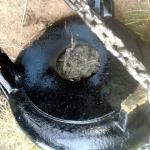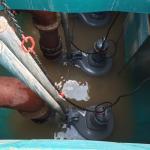Common Sewage Pumping Station Problems
The difference between a usual sewage system and having a sewage pumping station is the pumping chamber. This receives property sewage and is located lower than the property
The UK sewage system is made up of a network of crisscrossing pipes that transport waste from properties to the main sewer network. This transfer is usually powered by gravity with the mains sewer sitting below the property. However, when a property sits below the mains sewer the usual method doesn’t work. This is where a sewage pumping station comes into play.
What is a Sewage Pump Station?
The difference between a usual sewage system and having a sewage pumping station is the pumping chamber. This receives property sewage and is located lower than the property, the waste, therefore, flows into this holding chamber using gravity.
This sewage then sits in the holding chamber until it reaches a pre-set level, at this point the sewage pumps then activate and begin to push the sewage uphill out of the chamber. The sewage then reaches a point where gravity can take over and travels the rest of the way to the main sewer on its own.
Problems With a Sewage Pump Station
By nature, no matter how good your pumping system is, problems can occur, to reduce the chances of something serious happening, regular maintenance checks should be carried out. However, it is also good to be aware of some common problems that could arise, so you know what to look for.
Wet Wipes
The most common cause of system failure is blockages in the pumps caused by wet wipes. A major issue is how wet wipes are being marketed. In the past, most wet wipe manufacturers stated clearly that their products should be disposed of in a bin, rather than in a toilet.
Recently, however, they have allegedly upgraded their wet wipes designs so they can be flushed in a toilet without causing any issues. Unfortunately, the sad reality is that even these newer types of “flushable” wet wipes are causing major problems in pump systems across the country. This is because, unlike toilet paper, wet wipes don’t break up into a slurry as it passes through water.
Pump Not Pumping
This can be caused by various things including a worn or damaged impeller, a blockage in the pump volute, a faulty controls system, incorrect rotation of the pump motor, a blocked or closed valve, a damaged or blocked rising main, or the pump may just be broken.
Pump Not Turning Off
Usually, this could be due to the control float switch, sometimes debris, grease, and other deposits cause it to get stuck in the wrong position causing the pump to stay switched on. You may have a non-return valve jammed open allowing water to return into the chamber. If there is an unusual spike in your electricity bills, it could be a sign that your pump is not switching off correctly.
Alarms Sounding
Pumping stations can often be fitted with an alarm that will sound if the system detects a problem. This could include anything from high water levels to a malfunction. Our pumping stations typically allow for 24 hours of storage from the alarm to allow for time for an engineer to attend the site to rectify any issues. Make sure to contact a professional immediately if you hear the alarm to reduce the risk of flooding and damage to the system..
Maintenance Checks For Your Pumping Station
Many of the common issues that can affect pumping stations can be easily prevented. All it takes is regular maintenance checks. They can keep everything working smoothly while ensuring reliability, reduced operational costs and increased efficiency. All components are checked during these checks as well as carrying out any minor damages so it doesn’t become more serious.
Although there are various things that can go wrong with sewage pumping stations, that doesn’t mean that they are inadequate to use, they are actually very beneficial and can provide a great solution to people who live in a lower leveled properties.






